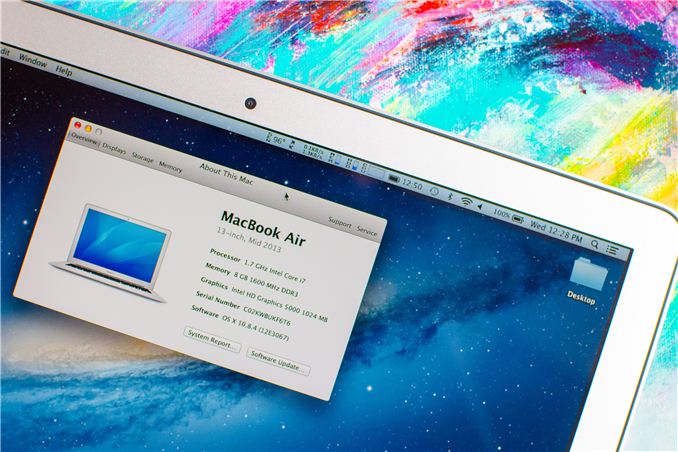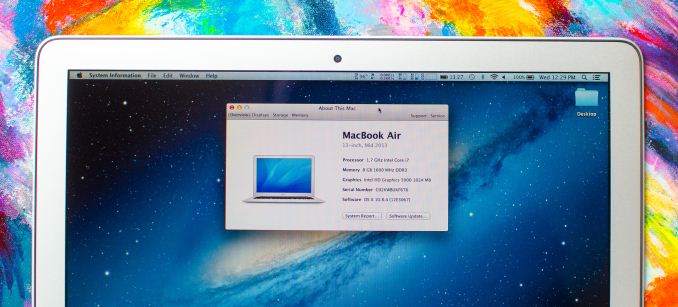The 2013 MacBook Air: Core i5-4250U vs. Core i7-4650U
by Anand Lal Shimpi on July 4, 2013 8:00 AM EST
Apple typically offers three different CPU upgrades in its portable Macs: the base CPU, one that comes with the upgraded SKU and a third BTO option that's even faster. In the case of the 2013 MacBook Air, Apple only offered two: a standard SKU (Core i5-4250U) and a BTO-only upgrade (Core i7-4650U). As we found in our initial review of the 2013 MacBook Air, the default Core i5 option ranged between substantially slower than last year's model to a hair quicker. The explanation was simple: with a lower base clock (1.3GHz), a lower TDP (15W vs. 17W) and more components sharing that TDP (CPU/GPU/PCH vs. just CPU/GPU), the default Core i5 CPU couldn't always keep up with last year's CPU.
For most users upgrading from an older machine the regression won't matter. The 2013 MBA includes a much faster SSD, better graphics, and better CPU performance compared to older MBAs as well. For those users who are either trying to make an ultraportable more of a workhorse, or who otherwise need more performance than last year's MBA can offer there is one solution. The BTO upgrade increases the base clock to 1.7GHz, adds an extra 1MB of L3 cache and includes much higher turbo frequencies:
| Apple 2013 MacBook Air CPU Comparison | |||||
| 1.3GHz dual-core | 1.7GHz dual-core | ||||
| Standard On | 11 & 13-inch MBA | Optional on Both | |||
| Intel Model | Core i5-4250U | Core i7-4650U | |||
| Base Clock Speed | 1.3GHz | 1.7GHz | |||
| Max SC Turbo | 2.6GHz | 3.3GHz | |||
| Max DC Turbo | 2.3GHz | 2.9GHz | |||
| L3 Cache | 3MB | 4MB | |||
| TSX-NI | No | Yes | |||
| TXT | No | Yes | |||
| AES-NI | Yes | Yes | |||
| VT-x/VT-x EPT | Yes | Yes | |||
| VT-d | Yes | Yes | |||
| TDP | 15W | 15W | |||
| Processor Graphics | Intel HD 5000 | Intel HD 5000 | |||
| GPU Clock (Base/Max) | 200/1000MHz | 200/1100MHz | |||
Careful binning makes all of this possible within the same TDP and cooling solution as the standard configuration.
The CPU upgrade comes at a fairly reasonable cost: $150 regardless of configuration. The max clocks increase by almost 30%, as does the size of the L3 cache. The obvious questions are how all of this impacts performance, battery life and thermals. Finally equipped with a 13-inch MBA with the i7-4650U upgrade, I can now answer those questions. The two systems are configured almost identically, although the i7-4650U configuration includes 8GB of memory instead of 4GB. Thankfully none of my tests show substantial scaling with memory capacity beyond 4GB so that shouldn't be a huge deal. Both SSDs are the same Samsung PCIe based solution. Let's start with performance.











127 Comments
View All Comments
Paapaa125 - Thursday, July 4, 2013 - link
You lack one kind of test:Test light/medium workload BUT equal the amount of work the units do. For example encode 2 hours of movies, reload the webpage 200 times and see the result. The workload is identical (i7 does it faster) and how does it affect the battery life?
Of course i7 uses more juice in heavy workload but it also accomplishes more. This is not necessarily fair.
lukarak - Thursday, July 4, 2013 - link
"What's important to note about all of these tests is that the amount of work done per cycle of the test doesn't vary based on performance. There's enough idle time baked in to make sure that the Core i7 based 13-inch MBA isn't artifically penalized by having to do more work than the i5 model simply because it's faster. "You obviously missed this?
Paapaa125 - Thursday, July 4, 2013 - link
Yes, I missed that. Very important correction, thanks! So i5 does more with the same battery life, just slower.ananduser - Thursday, July 4, 2013 - link
It doesn't do more. It does the same only slower. The i7 finishes the job faster and you pay a battery penalty for that, obviously.Paapaa125 - Friday, July 5, 2013 - link
Ok, let's sort this out. I was under impression that both computer do the same amount of work in same time? So if both ran a test for one hour, they accomplished the same thing?And as i5 can last longer than i7 in heavy load, it also can do more work, right?
ananduser - Friday, July 5, 2013 - link
Both kits are tested with the same amount of work. The i7 draws more power obviously but it also finishes its tasks faster than the i5. The i5 lasts longer but it also takes longer to finish the heavy load because it is slower.wallysb01 - Saturday, July 6, 2013 - link
Which shouldn't be too surprising, speed increases per Watt are not linear. I would have guessed in the sub 2.0GHz base clock rate range that it might be closer to linear than this showed though.Sugardaddy - Thursday, July 4, 2013 - link
That was a very good and informative article, thank you! Now if only we could get a review of the 28W Haswell chips!dineshramdin - Thursday, July 4, 2013 - link
It costs me around 140 bucks to upgrade my Core i7 CPU, which was pretty reasonable. However, i7-4650U includes a 8GB memory and the other one got one of 4GB, I guessAbelard - Thursday, July 4, 2013 - link
Those battery life figures are eye-poppingly good.